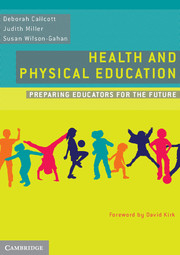Book contents
- Frontmatter
- Foreword
- Contents
- About the authors
- Acknowledgments
- Chapter 1 Introduction
- Chapter 2 The foundation of movement skills
- Chapter 3 Teaching inclusively
- Chapter 4 What all teachers need to know about movement
- Chapter 5 Pedagogy
- Chapter 6 Planning for teaching and learning
- Chapter 7 ICT and general capabilities in the Australian Curriculum
- Chapter 8 Assessment in health and physical education
- Chapter 9 Health education
- Glossary
- Bibliography
- Index
- References
Chapter 4 - What all teachers need to know about movement
- Frontmatter
- Foreword
- Contents
- About the authors
- Acknowledgments
- Chapter 1 Introduction
- Chapter 2 The foundation of movement skills
- Chapter 3 Teaching inclusively
- Chapter 4 What all teachers need to know about movement
- Chapter 5 Pedagogy
- Chapter 6 Planning for teaching and learning
- Chapter 7 ICT and general capabilities in the Australian Curriculum
- Chapter 8 Assessment in health and physical education
- Chapter 9 Health education
- Glossary
- Bibliography
- Index
- References
Summary
Learning objectives
By engaging with the text in this chapter, students will be able to:
recognise the importance of proficient movement skills in everyday life
define Developmental Coordination Disorder (DCD)
develop an understanding of the key specific signs and symptoms of DCD and the effect of DCD on behaviour and performance in the classroom and the playground
identify the effect of movement difficulties on the holistic development of children
consider current thinking and theories on movement difficulties and how these impact on teaching practices
recognise the need for effective early intervention for the majority of children with movement difficulties and provide best practice in the classroom, the playground and during physical education.
Ian is teaching the Year 4 class, and although there is a physical education specialist who takes the children for 50 minutes each week, Ian is aware that this is not enough time to address fitness parameters as well as develop skills. Ian decides that he will take the children out for physical education three extra times each week, working with the specialist to formulate developmentally appropriate programs for his class.
During a session early on in the year, Ian notices that two of the boys have many problems with movement skills. They show great difficulty in planning and executing their movements in games requiring catching and throwing and they look uncoordinated in locomotor skills such as running and skipping. Ian also notices that these boys have difficulty in dressing themselves after in-term swimming lessons and seem to require lots of assistance with buttons and shoelaces. One of the boys struggles to produce legible handwriting and the other boy is never organised with his pens, pencils and appropriate books to start work in the morning. It seems to Ian that, unlike the other children, the boy’s equipment is always all over the place instead of in his drawer or bag.
Ian decides to speak to the physical education specialist; however, as the specialist only sees the class once each week, he is unaware of any difficulties the boys are having other than they are the last to be picked for games. The specialist puts this down to the fact that they are both disruptive and no one really wants them on their team. He assures Ian that if they just try harder, they will improve like the other children.
- Type
- Chapter
- Information
- Health and Physical EducationPreparing Educators for the Future, pp. 59 - 76Publisher: Cambridge University PressPrint publication year: 2012



